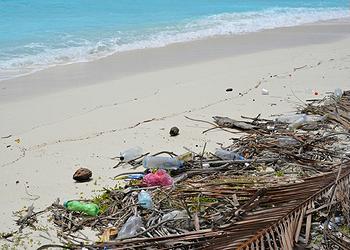
LONDON, UK, January 23, 2017 (ENS) – Anglo-Dutch multinational consumer goods giant Unilever has committed to ensuring that all of its plastic packaging is fully reusable, recyclable or compostable by 2025, and the company called on the entire fast-moving consumer goods industry to accelerate progress towards the circular economy.
The company, the world’s third largest consumer goods company after Procter & Gamble and Nestle, said it will ensure that “…it is technically possible for its plastic packaging to be reused or recycled and there are established, proven examples of it being commercially viable for plastics re-processors to recycle the material.”
The company’s product portfolio includes food, beverages, cleaning agents and personal care products.

Unilever CEO Paul Polman said, “Our plastic packaging plays a critical role in making our products appealing, safe and enjoyable for our consumers. Yet it is clear that if we want to continue to reap the benefits of this versatile material, we need to do much more as an industry to help ensure it is managed responsibly and efficiently post consumer-use.”
Three years ago, Unilever formed a Global Partnership with the Ellen MacArthur Foundation, the goal of which is to unlock the economic opportunities of the circular economy along the entire value chain.
According to the Ellen MacArthur Foundation, just 14 percent of the plastic packaging used globally makes its way to recycling plants, while 40 percent ends up in landfill and the rest pollutes fragile ecosystems.
Ellen MacArthur said, “By committing to ambitious circular economy goals for plastic packaging, Unilever is contributing to tangible system change and sends a strong signal to the entire fast-moving consumer goods industry. Combining upstream measures on design and materials with post-use strategies demonstrates the system-wide approach that is required to turn the New Plastics Economy into reality.”
As part of its pledge, Unilever will renew its Global Partnership with the Ellen MacArthur Foundation for another three years and endorse and support their New Plastics Economy initiative.
Unilever will publish the full “palette” of plastics materials used in its packaging by 2020 to help create a plastics protocol for the industry.

By these practices, Unilever intends to reduce the amount of its plastic packaging that winds up in the ocean. A scientific study released in 2015 estimated that eight million tons of plastics are swept into waterways annually, equivalent to a garbage truck load every minute.
“To address the challenge of ocean plastic waste we need to work on systemic solutions – ones which stop plastics entering our waterways in the first place,” Polman said. “We hope these commitments will encourage others in the industry to make collective progress towards ensuring that all of our plastic packaging is fully recyclable and recycled.”
Unilever also is working with other environmental groups to reduce the impact of its packaging on the oceans.
By 2050, it is estimated there will be more plastic than fish in the ocean, says the shareholder advocacy group As You Sow, which has been working with Unilever to achieve 100 percent reusable, recyclable or compostable plastic packaging.
As You Sow has been focusing on multi-laminate plastic pouches used for shampoos in small packages marketed in Asia that currently cannot be recycled. Much of these packages are discarded and end up polluting waterways in developing Asian countries due to their lack of solid waste management systems.
“We are pleased that Unilever heard our concerns and those of other stakeholders and made a significant commitment to recyclable packaging,” said Conrad MacKerron, senior vice president of As You Sow.
“We hope, however, that this timetable can be accelerated due to recent studies showing growing amounts of plastic waste ending up in oceans, where they harm marine life,” said MacKerron.
Architect and circular economy leader William McDonough says the cradle to cradle redesign of packaging is one of the great global design challenges of our time, similar to scaling renewable energy to address climate change.
McDonough said, “The optimization of packaging and plastics is so timely and important that all the people, communities and companies involved – suppliers, producers, retailers, customers and consumers – can work together now, with common values and purpose, to create and share beneficial value for generations to come.”

Treating plastic packaging as a valuable resource to be managed efficiently and effectively is a key priority in achieving the United Nations’ Sustainable Development Goal #12, Sustainable Consumption and Production.
In treating plastic packaging as a resource, Unilever says the company is shifting away from a “take-make-dispose” model of consumption to one that is fully circular.
Unilever says it will invest in proving, and then sharing with the industry, a technical solution to recycle multi-layered sachets, particularly for coastal areas which are most at risk of plastics leaking into the ocean
The company has already committed to reduce the weight of the packaging it uses this decade by one third by 2020, and increase its use of recycled plastic content in its packaging to at least 25 percent by 2025 against a 2015 baseline, both as part of the Unilever Sustainable Living Plan.
In 2015, it achieved its commitment of sending zero non-hazardous waste to landfill across its manufacturing operations.
“We also need to work in partnership with governments and other stakeholders to support the development and scaling up of collection and reprocessing infrastructure which is so critical in the transition towards a circular economy,” Polman said. “Ultimately, we want all of the industry’s plastic packaging to be fully circular.”
Copyright Environment News Service (ENS) 2017. All rights reserved.
© 2017, Environment News Service. All rights reserved. Content may be quoted only with proper attribution and a direct link to the original article. Full reproduction is prohibited.
